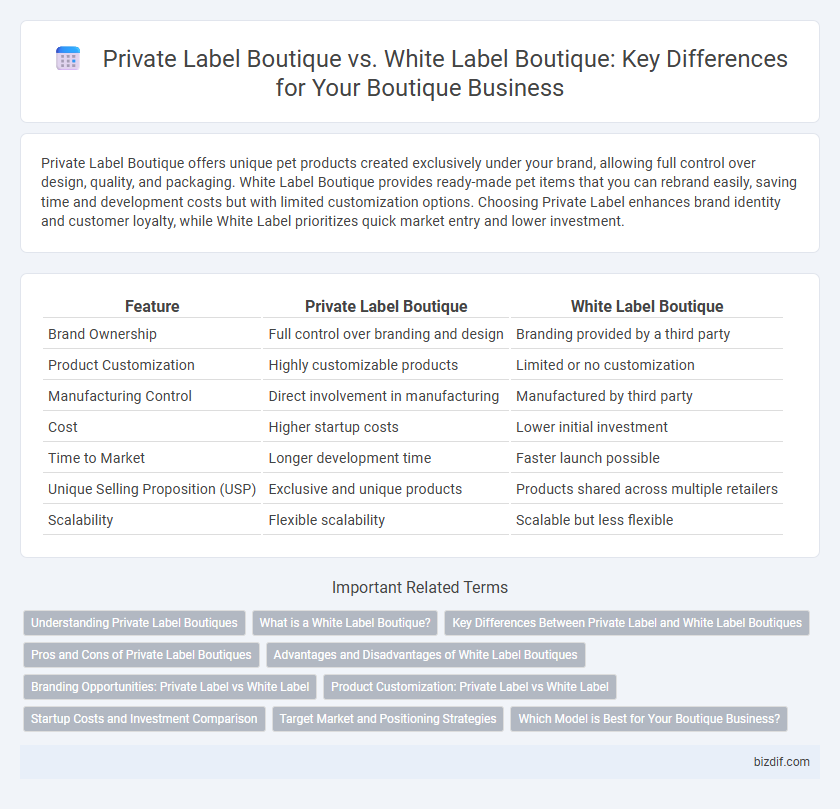Private Label Boutique offers unique pet products created exclusively under your brand, allowing full control over design, quality, and packaging. White Label Boutique provides ready-made pet items that you can rebrand easily, saving time and development costs but with limited customization options. Choosing Private Label enhances brand identity and customer loyalty, while White Label prioritizes quick market entry and lower investment.
Table of Comparison
| Feature | Private Label Boutique | White Label Boutique |
|---|---|---|
| Brand Ownership | Full control over branding and design | Branding provided by a third party |
| Product Customization | Highly customizable products | Limited or no customization |
| Manufacturing Control | Direct involvement in manufacturing | Manufactured by third party |
| Cost | Higher startup costs | Lower initial investment |
| Time to Market | Longer development time | Faster launch possible |
| Unique Selling Proposition (USP) | Exclusive and unique products | Products shared across multiple retailers |
| Scalability | Flexible scalability | Scalable but less flexible |
Understanding Private Label Boutiques
Private label boutiques develop and sell products exclusively designed and branded for their store, allowing full control over quality, design, and customer experience. Unlike white label boutiques that resell generic products under their brand, private label boutiques create unique items tailored to their target market's preferences. This distinction provides private label boutiques with stronger brand differentiation and higher profit margins.
What is a White Label Boutique?
A White Label Boutique offers products manufactured by a third party that retailers rebrand and sell as their own, allowing businesses to quickly enter the market without investing in product development. This model contrasts with Private Label Boutiques, where retailers have greater control over design and production, customizing products exclusively for their brand. White Label Boutiques enable fast scalability and lower upfront costs by leveraging existing product lines with tailored branding.
Key Differences Between Private Label and White Label Boutiques
Private label boutiques create exclusive, custom-branded products designed specifically for their brand identity, offering unique control over design and quality. White label boutiques sell pre-made products from manufacturers that can be rebranded by multiple retailers, providing faster time-to-market with lower upfront costs. Key differences include ownership of product design, level of customization, and brand exclusivity.
Pros and Cons of Private Label Boutiques
Private Label Boutiques offer unique branding opportunities and greater control over product quality, enabling businesses to build a distinct market identity and customer loyalty. However, they require significant investment in product development, inventory management, and marketing, which can increase operational complexity and financial risk. In contrast to White Label Boutiques, which provide ready-made products for faster market entry, Private Label Boutiques excel in customization but demand more resources and strategic planning.
Advantages and Disadvantages of White Label Boutiques
White label boutiques offer the advantage of faster market entry by using pre-designed products with branding flexibility, reducing development costs and time. However, they face disadvantages such as limited customization, potential brand dilution, and dependency on third-party manufacturers which can affect quality control. This contrasts with private label boutiques, where full ownership of product design and exclusivity can enhance brand identity but require higher investment and longer development cycles.
Branding Opportunities: Private Label vs White Label
Private label boutiques offer exclusive branding opportunities, allowing retailers to create unique products under their own brand name, fostering stronger customer loyalty and differentiation in the market. White label boutiques provide ready-made products that retailers can rebrand, enabling faster market entry but with limited customization and brand identity control. Choosing private label enhances long-term brand equity through distinct product development, while white label prioritizes convenience and speed with standardized offerings.
Product Customization: Private Label vs White Label
Private label boutiques offer extensive product customization, allowing businesses to design unique items tailored to their target market's preferences, including branding, packaging, and features. White label boutiques provide pre-made products with minimal customization options, typically limited to branding elements such as logos and labels. This distinction enables private label boutiques to create exclusive, differentiated products, while white label boutiques focus on faster market entry with standardized goods.
Startup Costs and Investment Comparison
Private label boutiques typically require higher startup costs due to custom product development, exclusive branding, and smaller production runs, resulting in significant upfront investment in design and manufacturing. White label boutiques benefit from lower initial expenses by reselling pre-made products with minimal customization, allowing entrepreneurs to launch quickly with reduced financial risk. Comparing investments, private label demands greater capital allocation for unique inventory and brand differentiation, while white label focuses on scalability and lower initial outlay, ideal for lean startup budgets.
Target Market and Positioning Strategies
Private label boutiques focus on creating unique, exclusive products tailored to niche markets, allowing for strong brand differentiation and a premium positioning strategy. White label boutiques offer generic products that can be rebranded and sold by multiple retailers, targeting broader markets with competitive pricing and faster time-to-market. Understanding the target audience's preferences and leveraging exclusivity or customization are key factors in positioning private label boutiques, while white label boutiques emphasize scalability and brand flexibility.
Which Model is Best for Your Boutique Business?
Choosing between a private label boutique and a white label boutique depends on your control over branding and product customization desires. Private label boutiques allow exclusive product development tailored to your brand identity, fostering unique market differentiation. White label boutiques offer ready-made products with customizable branding, ideal for faster market entry and lower initial investment.
Private Label Boutique vs White Label Boutique Infographic

 bizdif.com
bizdif.com